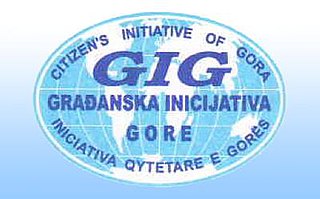The Democratic Party of Serbia is a national-conservative and Christian-democratic political party in Serbia.
G17 Plus (G17+), was a liberal-conservative political party in Serbia that existed from 2002 until 2013 when it merged into the United Regions of Serbia (URS).

The Liberal Party of Kosovo is a liberal political party in the Republic of Kosovo.
Parliamentary elections to the Assembly of Kosovo have been held four times since 1999 with the latest in December 2010. The Assembly was an institution within the Provisional Institutions of Self-Government (PISG) established by the United Nations Interim Administration Mission in Kosovo (UNMIK) to provide 'provisional, democratic self-government' in advance of a decision on the final status of Kosovo. Kosovo, formerly a province of Serbia, came under UN administration in 1999 and unilaterally declared its independence in February 2008. The Assembly elected in 2007 continued in office after the declaration of independence.

The Civic Initiative of Gora is a Gorani political party in Kosovo.
The politics of Kosovo, a disputed territory recognized by 113 out of 193 (58.5%) United Nations (UN) member states as an de facto independent state situated de jure within Serbia, takes place in a framework of a multi-party parliamentary representative democratic republic, whereby the President (Presidenti) is the head of state and the Prime Minister (Kryeministri) the head of government. Parliamentary elections are held every four years, the most recent in 2017.

The municipalities and cities are the second level administrative subdivisions of Serbia. The country is divided into 145 municipalities and 29 cities, forming the basic level of local government.

Parliamentary elections to the unicameral Assembly of Kosovo were held on 17 November 2007, together with municipal elections. The Assembly of Kosovo is the legislative branch of the Provisional Institutions of Self-Government that the United Nations Interim Administration Mission in Kosovo (UNMIK) created to help administration in Kosovo. The elections were scheduled by the Special Representative of the Secretary-General of the United Nations, Joachim Rücker on 1 September 2007.

Kosovo and Metohija, officially the Autonomous Province of Kosovo and Metohija, known as short Kosovo or simply Kosmet, refers to the region of Kosovo as defined in the Constitution of Serbia. The territory of the province is disputed between Serbia and the self-proclaimed Republic of Kosovo, the latter of which has de facto control. The region had functioned as part of Serbia for most of the period between 1912 and 1999.

Parliamentary elections were held in Serbia on 11 May 2008 to elect members of the National Assembly. The election was held barely a year after the previous parliamentary election. There were 6,749,886 eligible electors who were able to vote in 8,682 voting places, as well as 157 special voting stations for refugees from Kosovo.
The 2008 Serbian local elections in Kosovo were held on 11 May 2008, together with Serbia's parliamentary elections and elections in Vojvodina. UNMIK authorities have criticized Serbia organizing elections saying only the UN can organize elections in Kosovo. Kosovo's President Fatmir Sejdiu accused Serbia of trying to challenge Kosovo's statehood.

The Assembly of the Community of Municipalities of the Autonomous Province of Kosovo and Metohija, is the assembly of the association of local governments created by the municipal authorities in Kosovo elected in the May 11, 2008 municipal elections called by the Government of Serbia. It was created in Kosovska Mitrovica to represent the municipalities that defy the 2008 Kosovo declaration of independence. The Assembly is composed of 45 representatives delegated by 26 municipalities. The majority of delegates are ethnic Serbs, while some represent Gorani, Bosniak and Romani communities.
Local elections in Serbia were held on 6 May 2012. Pursuant to the Constitution of Serbia, the parliamentary Speaker signed on 13 March 2012 the Decision on calling the elections for councilors of municipal assemblies, town assemblies and the Belgrade City Assembly for 6 May 2012, with the exception of: the councilors of the municipal assemblies of Aranđelovac, Bor, Vrbas, Vrnjačka Banja, Knjaževac, Kovin, Kosjerić, Kosovska Mitrovica, Leposavić, Negotin, Novo Brdo, Odžaci, Peć, Prijepolje and Ruma and councilors of the Priština Town Assembly, which have already had extraordinary elections in the period from 2008 to 2012, while for councilors of the municipal assembly of Kula, the elections were already called earlier on 29 February 2012.

The Socialist Autonomous Province of Kosovo, comprising the Kosovo region, was one of the two autonomous provinces of Serbia within Yugoslavia, between 1945 and 1990, when it was renamed Autonomous Province of Kosovo and Metohija.
Serb List is a Serb minority political party in Kosovo.

Oliver Ivanović was a Kosovo Serb politician.
Nenad Milić is a politician in Serbia. At one time a prominent figure in Zoran Đinđić's administration, Milić has served in the National Assembly of Serbia on an almost continuous basis since 2007 as a member of the Liberal Democratic Party.
Dejan Radenković is a politician in Serbia. He has served in the National Assembly of Serbia on an almost continuous basis since 2008 as a member of the Socialist Party of Serbia.
Zvonimir Stević is a politician in Serbia. He is a prominent figure in the Kosovo Serb community and has served several terms in the assemblies of Yugoslavia and Serbia as a member of the Socialist Party of Serbia. From 2008 to 2012, he held a high-ranking position in Serbia's Ministry for Kosovo and Metohija.










